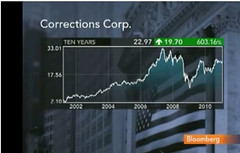According to Mari Herreras in Tucson Weekly, 26 October 2010,
They even made sure both the basic positions and the actual debate would be recorded: Continue readingThe American Friends Service Committee, Private Corrections Working Group, UA Latino Law Students Association, and St. Francis in the Foothills United Methodist Church have organized a series of private prison hearings across the state that kick off tomorrow in Tucson at Pima Community College, Downtown Campus at 1255 N. Stone Ave., in the Amethyst Room from 6 to 8 p.m., moderated by yours truly, Mari Herreras.
The public is invited to present testimony, but the AFSC has also invited representatives from the Arizona Department of Corrections, Corrections Corporation of America (expected to build a new prison in Tucson) and Management and Training Corporation (which manages the Marana Community Correctional Treatment Facility). Word is no one has responded from those organizations, but AFSC organizers know the following presenters will be there to provide critical information on the private prison industry: Stephen Nathan, editor of Prison Privatization Report International; Joe Glen, spokesman for Maricopa and Pima Juvenile Corrections Associations; Brent White, UA law professor; Jim Sanders, real estate appraiser; Susan Maurer, retired corrections commissioner from New Jersey; and Victoria Lopez, from ACLU of Arizona.
The hearing will include the following community leaders who will hear testimony and ask questions: Pima County Supervisor Richard Elias; Tucson City Councilman Steve Kozachik; Assistant Tucson City Manager Richard Miranda; Representative Phil Lopes; and Mark Kimble, former associate editor of the Tucson Citizen.









